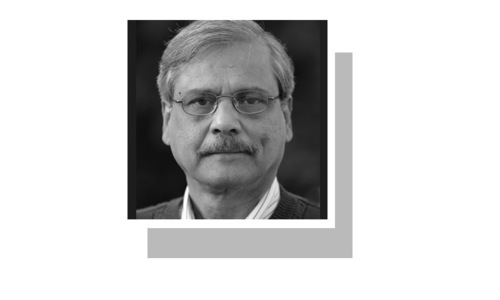
A single theme runs across the films of the British documentary filmmaker, Adam Curtis. He has scripted and directed over a dozen documentaries for the BBC. They are mostly sardonic laments on how, ever since the late 1970s, the state and governments have allowed their roles to recede in addressing various issues.
Curtis often tries to demonstrate that, in the wake of increasing economic, social and political complexities, states and governments that were once at the forefront of providing leadership and solutions, began to shrink from this responsibility. This happened particularly once the paradigm that they had established in this context began to shift, especially after the 1973 international oil crisis.
According to Curtis, governments began to outsource their responsibilities to large private operators such as banks and big businesses, which had furnished loans and services to them when they had been badly impacted by a series of economic downturns triggered by the crisis. The role of the state and government continued to shrink. To Curtis, politicians and civil servants who were once expected to lead and plan their countries’ progress and wellbeing, simply became nothing more than props.
However, from the mid-2000s, all eyes and expectations fell upon the state and government again when major financial scandals and economic recessions exposed the dangers of overtly banking on the private sector to provide services which were once the domain and purpose of state and government institutions. In the July 24, 2012 issue of The Guardian, the British philosopher Julian Baggini writes that governments struggled to come to terms with the economic and social fallout of the new recessions. What’s more, by then, the public had also lost their trust in the private sector.
Realising their inability to address and resolve real problems such as economic declines, politicians opt to present themselves as guardians of other things such as morality
According to Baggini, unable or feeling helpless to address and resolve the problems, politicians began to look to present themselves as guardians of other things. If they were unable to prevent economic declines, they posed that they were now there to halt moral declines.
Baggini writes that the most fundamental problem with morality is that society still lacks a sense of where it comes from and who is qualified to make claims for it. There is great irony in politicians, a naturally amoral lot, speaking of morality. Baggini is right to observe that most people are highly sceptical of politicians in this regard. And it is also a fact that those whose domain it was to define and judge morality — i.e. priests, clerics, etc. — lost their credibility after the rapid emergence of modernity.
Therefore, according to Baggini, “the danger is that we will either fall back on the old authorities or allow new moral leaders to emerge who may well base their pronouncements on little more than populist sentiment.”
This is exactly what has been happening in various countries since Baggini wrote his essay eight years ago. Unable to control economic declines, various heads of governments in Europe, South and North America, and in South and East Asia, have increased their talk about morality, in an attempt to distract the attention of the polity from larger and less abstract issues.
India’s Modi promised economic miracles but, after being in power for almost six years, there has been more talk about mandirs (temples), mosques, cows and the Hindutva identity than about the country’s faltering economy. Trump, before his defeat in this year’s presidential election in the US, continued to surround himself with animated Christian evangelists, while completely failing to control the spread of Covid-19 in the US and the devastating impact it has had on the country’s economy.
Governments in Brazil, Philippines, Turkey, Pakistan, Hungary and Poland are adopting similar tactics. For example, in the face of the rising criticism on his regime’s chaotic style of governance and its mishandling of the economy, Pakistan’s Prime Minister Imran Khan constantly reminds everyone how he overcame the dangers of Westernisation and colonialism to become a man of impeccable morals. He says this after milking everything there was to about such ‘immoral’ Westernisation when he was a popular lifestyle liberal, before he turned 40 and ‘rediscovered his faith.’

As Pakistan’s economy continues to nosedive and opposition parties prepare to oust him after accusing him of incompetence, Khan can often be seen lecturing young people on what Islam is, what the poet-philosopher Iqbal meant, and how to understand Sufism though Turkish soap operas!
To most sociologists, the idea of morality largely derives from and attracts the urban middle-classes. It is this class that is most receptive to Imran Khan’s moral posturing. In a 1993 essay for the Wilson Quarterly, the American political scientist and sociologist Allan Wolfe writes that the “old middle class” that experienced some form of economic prosperity in the 1960s because of the developmental economics that was all the rage at the time, was less concerned with morality as an issue. After the 1973 oil crisis, when global economies began to cave in, a new middle class emerged. But this one had to struggle more than the previous one.
According to Wolfe, there are, therefore, two competing ideas of middle-class morality. Coming of age in uncertain times, the middle class that appeared from the turmoil of the 1970s tries to save moral capital rather than economic capital. Wolfe writes that it is a lot more conservative than the older middle class and wants morality to take centre stage in political and social discourses. But he also writes that this may include those who would rather exhibit morality in public while largely ignoring it in private, creating cognitive dissonance.
A report published in the April 2, 1977 issue of the now defunct Pakistani ‘eveninger’ Leader, quotes a young shopkeeper in Karachi who was taking part in the movement against the Z.A. Bhutto regime. He tells the reporter that “Bhutto [with his socialist policies] had usurped the dignity of the country’s middle classes.” He also adds that the regime was doing this by spreading immorality and obscenity, even though he was interviewed while coming out from a cinema after enjoying a Hollywood film. Post-1970s generations of the urban middle classes in Pakistan too are examples of cognitive dissonance in this context.
But this is how they address it. PM Khan tries to rationalise this dissonance by suggesting that it is actually a mandate of the country’s majority faith that morality be highlighted in public and episodes of immorality be kept private and not spoken about.
This idea of middle-class morality thus absolves him of hypocrisy, comforting him to go on lecturing without having to bother about the irony attached to it, and without addressing more tangible issues, such as a depressed economy and political polarisation.
Published in Dawn, EOS, December 13th, 2020













































